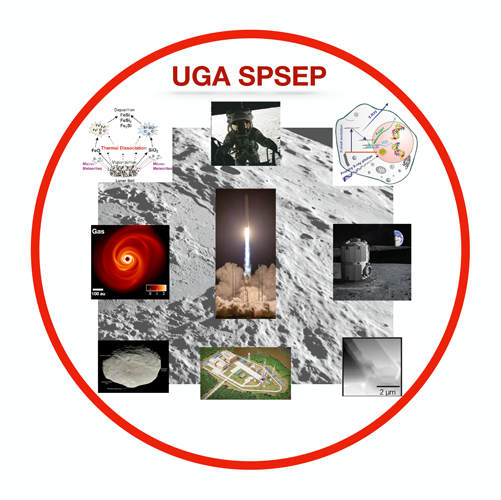Teaming for Interdisciplinary Research Pre-Seed Program
UGA Space and Planetary Science and Engineering Program

UGA Space and Planetary Science and Engineering Program

A confluence of initiatives in the Space Sciences over the past few years has brought the exciting prospect of returning humankind to the moon and beyond. This effort is spearheaded by NASA’s Artemis Project which will begin by delivering astronauts into lunar orbit as early as 2024. However, the enormity of this actual “moon-shot” opens up a huge range of supporting science, engineering, and social science opportunities for which UGA, as well as our partner institutions in the state, are ideally equipped to make significant contributions. The seed for this local effort began in early 2020 with the GA Human Space Flight Initiative headed up by Glen Lightsey and Thom Orlando from GA Tech which was broadened to include UGA and Emory. Further, GA may get its first small rocket launch site if the FAA grants the Camden Spaceport a permit. To get UGA’s effort in this area off the ground, we propose an interdisciplinary team in space and planetary science and engineering.
UGA already has made a mark in the space sciences with the launch of its first satellite in 2020, built by the Small Satellite Research Lab, with other CubeSats under construction. Further, UGA has established programs in planetary geology, atmospheric sciences, advanced materials, astrophysics, and a burgeoning engineering school. Finally, other faculty in medicine, journalism, and public affairs have interests in the space exploration domain.
The initial focus of this effort will be to develop ideas for team proposals in a host of space and planetary science and engineering areas through group meetings, small workshops, visits to potential collaborators, and funding sources. Clearly, NASA is the prime funding agency for this effort through its many directorates (Science, Space Technology, Mission Support, etc.), but certain opportunities may exist in industry. Two immediate target of opportunities have already been identified:
- The preparation of a white paper to the NASA Small Spacecraft Technology Program to build 2 small satellite buses per year to meet their demand. These buses would be built by students in the SSRL likely as part of a capstone project.
- A proposal to the NASA Planetary Science program for the Laboratory Analysis of Returned Samples, i.e., rocks from the Moon, asteroids, and eventually Mars, using nanooptics approaches developed at UGA and may lead to a national facility for sample analysis.
Further, the team members have come up with a vast range of initial ideas to pursue including: i) space environmental effects on materials for communications, shielding, and electronics, ii) space environmental effects on human health, medicine, and in-situ monitoring, iii) space environmental effects on biomolecules, iv) physics and geology of extraterrestrial surfaces, v) habitability of extraterrestrial environments for humans/plants, v) vibration/acoustic effects on spacecraft and payloads, vi) legal, social, and public administration aspects of space exploration, vii) journalism, fiction, and arts in space exploration, viii) In-situ astrophysics investigations from and geophysics studies on the moon, and ix) assessing public support for space exploration.
The pre-seed funding will be used to build and maintain a team website, contribute to team meeting and workshop expenses, cover travel to relevant collaborator and funder sites, and possibly for salaries for part-time students to engage in group literature search and research.
Team Lead
Phillip Stancil
Department of Physics and Astronomy
pstancil@uga.edu
Team Members
Isiah Lavender
Department of English
Deepak Mishra
Department of Geography
Samantha Joye
Department of Marine Sciences
Tina Salguero
Department of Chemistry
Jennifer Gay
College of Public Health
Fred Beyette, Jr.
College of Engineering
Susanne Ullrich
Department of Physics and Astronomy
Andy Whitford
School of Public and International Affairs
Kevin McCully
Mary Frances Early College of Education
